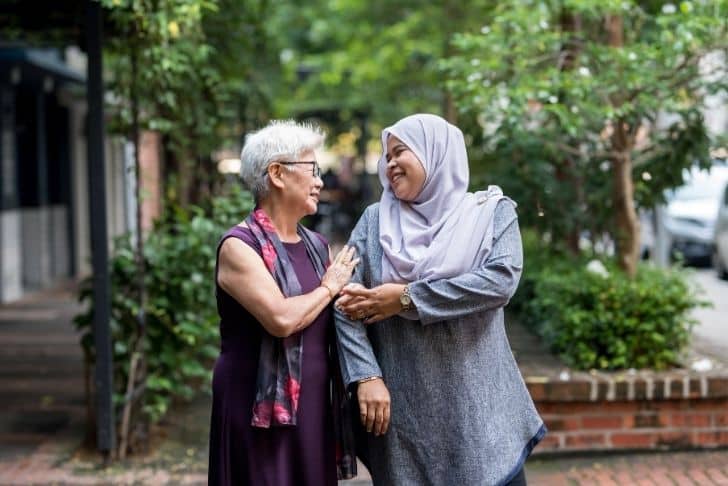Living at home, even during the later stages of disease progression, is a reality for a significant number of the 5.8 million American individuals battling dementia including Alzheimer’s. If you’re a family member or friend providing this home care, you’re all too familiar with the responsibilities and strains that come with looking after your loved ones. However, many resources and modifications can ease this journey, such as understanding and accepting your loved one’s diagnosis, making simple home safety adjustments, and looking towards local community support. While paying attention to your own mental and physical health, you can also seek professional help from dementia care coordinators, adult daycares, and meal services. Depending on individual needs, the transition to retirement communities equipped for such care should not be ruled out. This article provides insight into these support systems, as well as the challenges faced when caregiving for dementia patients at home.
Understanding and Accepting Dementia Diagnosis
When it comes to effective home care for dementia patients, the first crucial step is understanding and accepting your loved one’s dementia diagnosis. This could involve a steep learning curve, but there’s no need to worry. To successfully overcome this hurdle, ensuring you’re well-informed about dementia is key.
Acquiring education on dementia
Acquiring the right education on dementia will equip you with the skills and understanding required. This encompasses gaining insights about what dementia is, the progression of the disease, and the implications it will have on your loved ones. In-depth knowledge about dementia will not only improve the care you provide but also help you to adjust your expectations appropriately.
Accessing resources from Alzheimer’s support organizations
Many Alzheimer’s support organizations serve as excellent resources to assist families in the process of understanding and caring for dementia patients. They prepare you for the journey ahead, providing materials, courses, and seminars that give practical, accessible, and comprehensive information about diagnoses, care requirements, and much more.
Recognizing the severity and impact of dementia
Coming to terms with the severity of dementia is as important as understanding it. Knowing that your loved one’s actions and behaviors are due to the illness and not wilful action can help you manage challenges calmly and effectively. Remember, dementia has a broad impact, affecting the patient’s memory, cognition, behavior, and ultimately, their ability to perform everyday activities.
Challenges of Home Caregiving for Dementia Patients
Caring for a loved one with dementia at home is not without its challenges. Often, this responsibility falls on the shoulders of family members or friends who might already be dealing with their physical, financial, and emotional issues.
Physical burden on caregivers
One of the pressing issues faced by caregivers is the physical demand it takes on their bodies. Providing round-the-clock care to a loved one and carrying out all home chores can be physically draining, leading to fatigue and other health issues.
Financial strain due to caregiving responsibilities
Beside physical challenges, many caregivers also experience financial strain. The costs of medical care, home safety modifications, and frequent hospital visits can quickly pile up, making it challenging to maintain financial stability while providing necessary care.
Emotional stress, anxiety, and depression
Caring for a loved one with dementia can also take an emotional toll. The constant worry, the progressive nature of the illness, the role reversal, and the gradual loss of the person they knew can lead to a variety of negative emotions, including stress, anxiety, and depression.
Dealing with behavioral disturbances in dementia patients
Managing behavioral disturbances is another significant challenge faced by caregivers. These can range from aggression, mood swings, and even hallucinations. Handling such situations without professional training can be difficult and emotionally charged.
Lack of professional training for family caregivers
Often, family caregivers may lack the professional training required to handle dementia care. All these factors make home caregiving for dementia patients a demanding task that may affect caregivers’ overall health and quality of life.

Home Safety Modifications for Dementia Patients
Ensuring safety at home is of paramount importance for dementia patients. Simple modifications can hugely improve home safety and make the caregiving journey slightly easier.
Installation of safety features in the bathroom
The bathroom can pose quite a few hazards for dementia patients with their slippery floors. Installing grab bars, using non-slip mats, and having adequate lighting can make a massive difference when it comes to safety.
Securing carpets to prevent falls
Fastening carpets and removing any tripping hazards is vital in preventing falls and ensuing injuries. Clearing clutter, ensuring clear paths for movement and adequate lighting can also assist in this regard.
Locking up dangerous areas and items in the house
Dementia patients might lose their judgement of what’s safe and what’s not. Therefore, it’s necessary to lock up potentially dangerous items and areas. This could include medicine cabinets, kitchens, and storage rooms with tools and equipment.
Coping Mechanisms for Caregivers
While taking care of a loved one, don’t overlook your wellbeing. It’s evident that caregivers face enormous pressure, so to avoid burnout and other health issues, employing some coping strategies is necessary.
Self-care practices
Ensuring you maintain healthy eating habits, get regular exercise, and secure a good night’s sleep are crucial self-care practices. Making time for activities you enjoy and that relieve stress also contributes massively to your wellbeing.
Scheduling breaks and respite
Incorporate regular breaks in your schedule to recharge. Caregiving is not a task that you should tackle alone. Enlist the help of other family members, friends, or caregiving agencies, and recharge during these breaks.
Peer support and counseling
Joining a caregiver support group can be a great way to cope with the challenges. Sharing your feelings and experiences with those in similar situations often provides a sense of relief and shared understanding. Professional counseling is also an option if the emotional toll becomes overwhelming.
Seeking medical help when faced with burnout
Ignoring signs of burnout and continuing to work under stress can lead to severe health problems. Should you experience chronic fatigue, sleeplessness, or feelings of hopelessness, immediately seek medical help. Remember, you can only provide effective care to others if you’re in good health yourself.

Role of Dementia Care Coordinators
Dementia care coordinators can be of immense help to home-based caregivers. Care coordinators are professionals who can provide a range of services to help manage the duties and challenges of caregiving more effectively.
Addressing home safety concerns
Their expertise can be invaluable in guiding you about necessary modifications needed at home to ensure the safety of your loved one. They can do a thorough evaluation of your home, identifying potential risks and providing solutions for the same.
Providing medical attention and medication management
They can manage the medical side of things by coordinating doctor appointments and managing medications. Regular health checkups, timely medication, and informed medical decision-making significantly enhance the wellbeing of dementia patients.
Offering nutritional support and diet advice
Appropriate nutrition plays a crucial role in the overall health of dementia patients. Care coordinators can provide guidance about a well-balanced diet, taking into consideration the dietary habits, preferences, and medicine schedule of dementia patients.
Importance of Medical Alert Systems
The introduction of medical alert systems has revolutionized home care for dementia patients, offering an extra layer of security to both patients and caregivers.
Types of medical alert systems available
There’s an assortment of medical alert systems available in the market, each having unique features. For example, some devices provide fall detection, others can be used for location tracking, and some offer emergency call buttons for immediate help.
How these systems enhance patient security
These systems can be a life-saving accessory in emergencies. For instance, if the dementia patient falls or wanders, the system can alert you immediately, ensuring prompt assistance and averting any serious harm.
Relief provided to caregivers by these systems
These systems also provide immense relief to caregivers, who no longer need to be on constant high alert. Knowing that they will be immediately informed if there’s an emergency allows them some peace of mind and the ability to focus on other important tasks.

Accessing Local Community Services
Local community services can provide much-needed respite to exhausted caregivers and also enhance the care provided to dementia patients.
Benefits of adult daycare centers
Adult daycare centers can be an excellent option for caregivers in need of a break. They offer a safe, supervised environment for dementia patients, allowing caregivers time off from their duties.
Role of certified nursing assistants and in-home health aides
Hiring certified nursing assistants or in-home health aides can be a big relief. They are trained professionals who not only care for the individual but also manage housekeeping chores, freeing up time and lessening some of the burdens on caregivers.
Advantages of meal delivery services
Meal delivery services can remarkably simplify caregiving, ensuring the provision of nutritious, ready-to-eat meals that cater to the dietary needs of dementia patients.
Exploring Alternatives: Nursing Homes and Assisted Living
Although many people with dementia continue to live at home through all stages of the disease, it’s worth exploring alternatives such as nursing homes and assisted living residences. Each family’s needs vary, and these facilities might be the right alterative for some.
Determining if a nursing home is a suitable option
Determining whether nursing home care is suitable depends on factors like the stage and severity of dementia, the caregiver’s physical ability, and financial resources. Nursing homes provide all-inclusive care, including medical attention, meals, social activities, and personal care.
Understanding the services provided by assisted living residences
Assisted living residences offer a bit more independence to the residents. People with dementia live in their apartments, and the facility provides necessary assistance with personal care, meals, and medicine administration.
Considering Retirement Communities
Retirement communities are another potential option for dementia care. They offer a unique blend of independence and support.
Key features of a 55 and older community
Communities designed for 55 and older offer several advantages, including access to group activities that promote social engagement, transportation services, security measures, and healthcare facilities.
Understanding the care provided in these communities
The level of care provided in these communities can vary. Some may offer round-the-clock nursing staff, meal services, outings, and activities—all aiming to ensure a comfortable, enjoyable, and secure living environment for the residents.
Determining if a move to a retirement community is necessary
A move to a retirement community should be considered if it’s challenging to provide necessary care at home or if a dementia patient could benefit from more social interactions or the structured environment these communities provide.
Unmet Dementia-related Care Needs
Despite the best efforts of caregivers and the assistance of several support systems, there are typically some unmet needs in dementia care. Researchers at Johns Hopkins found that 97% to 99% of people with dementia and their caregivers had unmet dementia-related care needs, underlining their prevalence.
Understanding the research on unmet needs
Unmet needs can span across several areas, such as medical care, safety issues, social engagements, and others. Gaining an understanding of these through focused research can help us improve the care we provide to those with dementia.
Strategies to address these needs
Various strategies can be employed to meet these needs. This might include availing professional services, including a caregiver support group, attending educational programs, and exploring all available resources.
Engaging medical professionals to assist in fulfilling unmet needs
The expertise of medical professionals can prove invaluable in identifying and addressing unmet needs. Regular check-ups, timely medical intervention, and consistent medication management can significantly enhance overall patient care.
Finally, remember that caring for a loved one with dementia is not an easy task. Take small steps, do thorough research and use all available resources. Most importantly, take care of yourself and remember that you are doing the best you can under difficult circumstances. Your efforts and sacrifices are immensely valued, and you are not alone in this journey.
